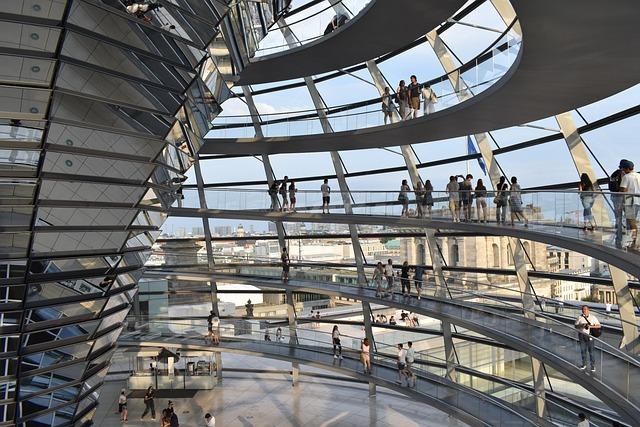Germany has announced a significant revision to its energy strategy, scaling back plans for new gas-fired power generation as part of a broader compromise aimed at accelerating the country’s decarbonisation efforts. The move reflects ongoing tensions between the need to ensure energy security and the imperative to reduce carbon emissions amid rising climate commitments. Industry experts and policymakers are weighing the implications of this shift for Germany’s energy transition and its role in the European market.
Germany Reduces Gas Power Expansion to Balance Energy Security and Climate Goals
In a strategic move to harmonize its dual objectives of ensuring reliable energy supply and advancing climate commitments, Germany has announced a significant reduction in its planned expansion of gas-fired power plants. The government’s recalibrated approach prioritizes investments in renewable energy sources while maintaining a measured role for gas infrastructure as a transitional technology. This shift reflects growing concerns over long-term carbon emissions and the increasing feasibility of green alternatives, even as energy security remains paramount in the face of recent geopolitical tensions.
Officials emphasized a balanced framework designed to:
- Limit new gas capacity to essential projects only, focusing on grid stability during peak demand periods.
- Boost renewable energy production with accelerated timelines for wind and solar installations.
- Enhance energy storage solutions to mitigate intermittent supply challenges from renewables.
- Implement stricter emissions targets for existing and future gas plants.
| Energy Source | 2023 Capacity (GW) | 2028 Projected Capacity (GW) | Change (%) |
|---|---|---|---|
| Gas-fired Power | 30 | 32 | +6.7% |
| Wind Power | 60 | 80 | +33.3% |
| Solar Power | 50 | 75 | +50% |
| Energy Storage | 5 | 20 | +300% |
Experts Weigh Impact of Scaled-Back Gas Projects on Decarbonisation Targets
Industry experts express mixed reactions following Germany’s decision to scale back its new gas power projects. While some analysts argue that reducing dependence on gas-fired plants is a necessary step toward achieving the country’s ambitious decarbonisation goals, others caution that the move might slow down the transition by limiting backup capacity essential for grid stability. Renewable energy specialists emphasize accelerating investments in wind, solar, and hydrogen technologies to fill the looming gap, while grid operators warn of potential challenges during peak demand periods if alternative infrastructure is not rapidly deployed.
Environmental analysts highlight the trade-offs involved, underscoring both the short-term and long-term implications. Below is a concise overview of the key points debated by experts:
- Decarbonisation acceleration: Reduced gas projects push faster commitment to renewables.
- Grid reliability concerns: Risk of intermittent power supply without sufficient backup.
- Economic impacts: Potential rise in energy costs during transitional periods.
- Technological innovation: Incentivizes hydrogen and battery storage R&D.
| Aspect | Positive Impact | Challenge |
|---|---|---|
| Climate Goals | Lower emissions from fossil fuels | Risk of delayed grid readiness |
| Energy Security | Promotes diverse energy sources | Potential supply gaps during peak demand |
| Market Dynamics | Stimulates renewables investment | Increased short-term electricity prices |
Policy Recommendations for Accelerating Renewable Integration Amid Shifts in Gas Strategy
In light of Germany’s recent decision to scale back new gas-power generation projects, policymakers must focus on accelerating renewable energy integration with targeted, adaptive strategies. Prioritizing investment in grid modernization and storage technologies is essential to handle the intermittent nature of wind and solar power while ensuring energy security. To complement these efforts, regulatory frameworks should incentivize demand-side management and flexible consumption patterns, empowering consumers and businesses to actively contribute to grid stability. This approach not only mitigates reliance on fossil fuel imports but also aligns with the nation’s ambitious climate goals.
Key measures to advance this transition include:
- Enhancing cross-border grid interconnections for efficient energy flow across Europe.
- Streamlining permitting processes to reduce delays in renewable project deployment.
- Expanding support for green hydrogen as a versatile energy carrier and storage medium.
- Implementing dynamic pricing models to reflect real-time supply and demand.
| Policy Area | Recommended Action | Impact |
|---|---|---|
| Grid Infrastructure | Upgrade and digitalize networks | Improved reliability & flexibility |
| Market Design | Introduce real-time pricing | Better demand response |
| Hydrogen Economy | Subsidize green hydrogen R&D | Diversified low-carbon energy |
| Permitting | Simplify approval processes | Faster renewable deployment |
Final Thoughts
As Germany adjusts its energy strategy by scaling back new gas-power generation plans, the government faces the complex challenge of balancing decarbonisation goals with energy security and economic considerations. This compromise highlights the ongoing tensions in the transition toward a sustainable energy future, underscoring the careful calibration required to meet climate targets while maintaining reliable power supply. Observers will be watching closely to see how these revised plans unfold amid broader European efforts to reduce carbon emissions.




